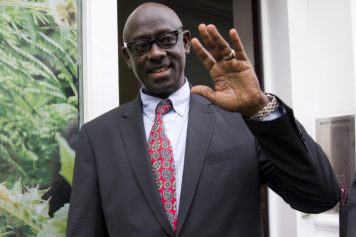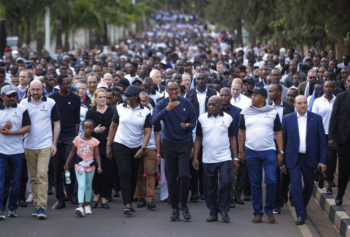The Ugandan military has begun the process of disarming large numbers of rebels from the neighboring Democratic Republic of Congo, a military spokesman said Thursday.
The rebel group, known as M23, announced Tuesday that it was giving up its armed struggle, marking a significant turning point in the 20-month conflict that had brought renewed violence to eastern Congo. The decision came after more than a week of rapid advances by the Congolese Army, supported by United Nations forces, which drove M23 out of territory it had controlled for more than a year, according to a report in the New York Times.
Capt. Ronald Kakurungu, military spokesman for the western region of Uganda, said that 1,365 members of M23 had surrendered to Ugandan forces. “We are receiving and disarming them,” he said. The surrenders were a sign that the group was carrying out its stated position to end its violent rebellion and demobilize its fighters.
“They came with a big number of weapons, but we are still counting them and categorizing them,” Kakurungu said. “Everybody had a weapon.”
There were some news reports that the group’s military commander, Gen. Sultani Makenga, was among those who had crossed into Uganda and turned themselves in to the authorities there, including one account that he had surrendered on Wednesday and was being held along with other rebel commanders.
But two spokesmen for the Ugandan military said he had not been seen among the surrendering troops.
Sultani Makenga, M23 rebel leader
According to the BBC, Makenga, 40, often walked around with a stick – it symbolized that he was both a cattle-herder and a military commander who demanded order and discipline from his troops.
A tall, thin man born to an ethnic Tutsi family and raised in the hills of the volcanic South Kivu region, Makenga has a reputation as a sharp-shooter and a shrewd and wily military strategist.
Makenga honed his military skills in Rwanda, where he fought on the side of President Paul Kagame’s mainly Tutsi rebels before they took power in Kigali in 1994, ending a genocide that claimed some 800,000 lives in three months.
Some three years later, Makenga joined Rwandan-backed troops who seized power in the DR Congo, ousting long-serving ruler Mobutu Sese Seko and installing Laurent Kabila – the father of incumbent leader Joseph Kabila – as president.


